#amulet talisman
Explore tagged Tumblr posts
Photo

Shani Protection Ring Star Saturn Iron Horse Shoe Black Chala Astrology O14G NEW Shani Protection Ring Star Saturn Iron Horse Shoe Black Chala Astrology NEW Design: O14G Word Shani Written in Hindi/Devnagri Lipi and STAR engraved on Challa/Ring Shani/Evil Eye Protection Saturn Plain Iron Ring Made from Horse Shoe - Astrological Ring Design as shown in Photos. They can be worn by anyone at any time. They are most commonly worn during Saturn dasa periods or Shani Sadhe Sati or during a current planetary transit of Saturn. These rings are most effective when worn on the right middle finger for men and the left middle finger for women. Iron rings are made from the shoes of black horses or from iron nails from wooden boats. They are traditionally worn on Saturday. These are handmade in the holy city of Amritsar Punjab and have powerful Shani Protection Iron Rings are very powerful and traditionally worn to neutralise the bad influences of the planet Saturn (Shani). One ring per sale unless you add more quantity.
#Shani Ring#Shani Challa#Evil Eye Protection#Saturn Astrology#Horoscope#Hindu Hinduism#Chalisa Kavach#Amulet Talisman#India Yoga#Yantar Mantar#Black Magic#Nazar Shield#Pagan Good Luck
1 note
·
View note
Text

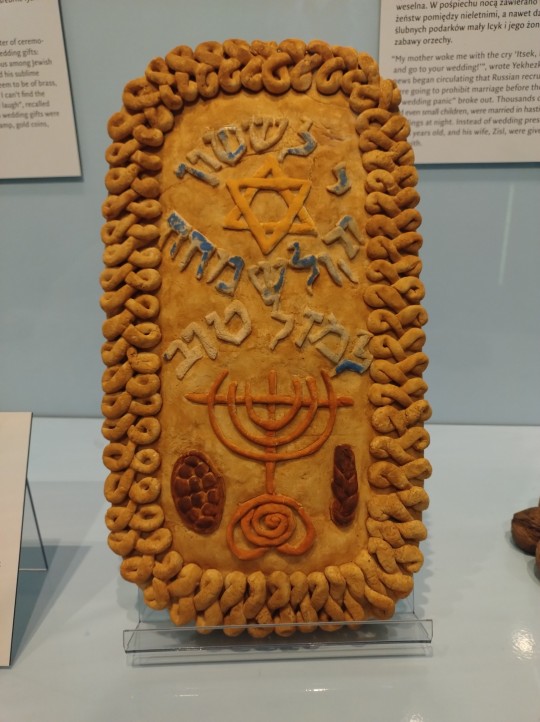
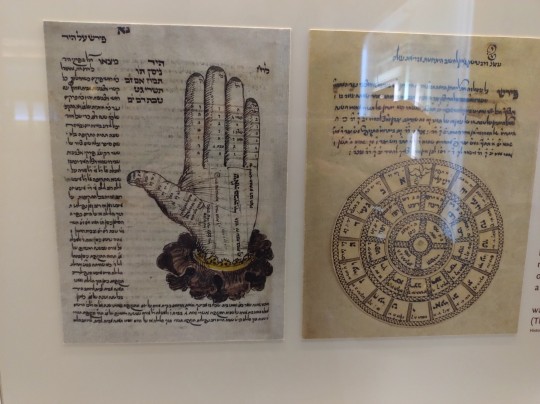
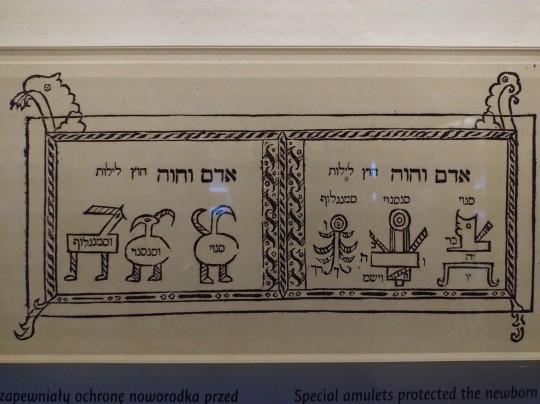
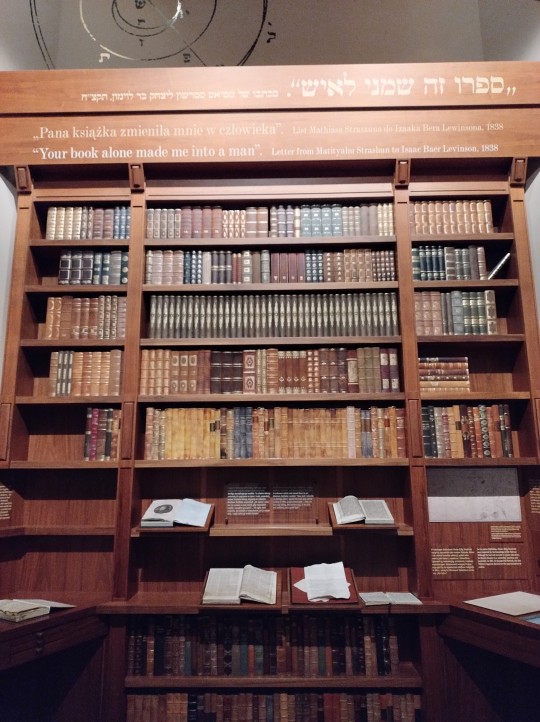

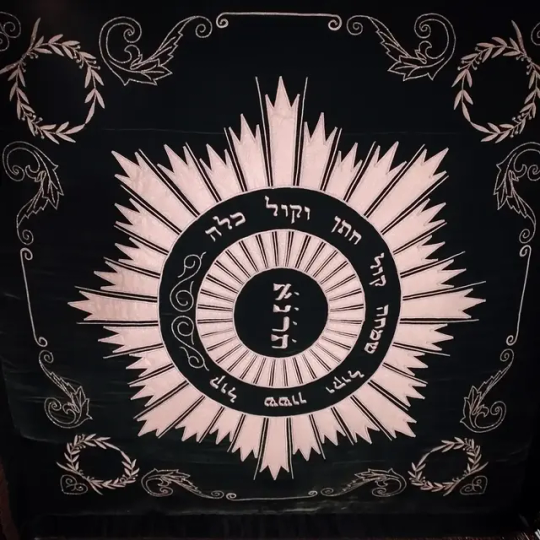
Polin museum of the History of Polish Jews, Warsaw, Poland
It's a great place, very worth seeing
#jidysz#jewish culture#jews in poland#yiddish culture#jewish history#jewish#jews#ashkenazi culture#ashkenazi jews#ashkenazi#synagogue#jeshiva#kabala#jewish amulet#jewish talisman#canopy#jewish wedding#polin#polin museum#warsaw#poland#polish jews#jewish museum
1K notes
·
View notes
Text
Collecting And Utilizing Magick Charms
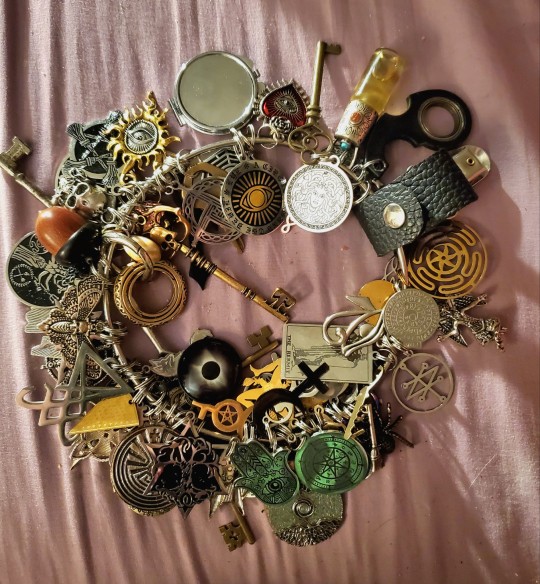
My personal charm collection.
Magick charms are small, enchanted objects used for protection, luck, attraction, and spiritual power. Witches, shamans, and mystics have used charms for centuries to enhance spells, manifest intentions, and guard against negative forces. This comprehensive guide will help you collect, store, and use charms effectively in your witchcraft.
What is a Magick Charm?
A magick charm is any object infused with energy or intention to create a desired effect. Unlike talismans (which attract energy) or amulets (which repel energy), charms can do both, depending on their purpose.
Uses of Magick Charms in Witchcraft:
• Protection – Shields against negative energy, hexes, and harm.
• Luck & Prosperity – Draws fortune, money, and success.
• Love & Attraction – Enhances self-love, relationships, and passion.
• Healing & Wellness – Promotes emotional, physical, and spiritual health.
• Psychic Abilities & Divination – Strengthens intuition, dreamwork, and spirit communication.
• Manifestation & Goal Achievement – Focuses energy on specific desires.
Collecting Magick Charms
Magick charms can be found, crafted, or gifted. The key is choosing objects that resonate with your energy and intention.
Where to Find Charms:
• Nature – Stones, feathers, shells, acorns, bones, dried herbs.
• Thrift Shops & Antique Stores – Old jewelry, keys, trinkets, coins.
• Personal Objects – Lockets, rings, buttons, meaningful tokens.
• Handmade Charms – Sigil-carved wood, cloth pouches filled with herbs, inscribed coins.
• Cultural or Spiritual Items – Religious symbols, runes, lucky talismans.
A List of Magick Charms & Their Meanings
Protection Symbols & Charms:
• Pentacle/Pentagram – A five-pointed star within a circle, symbolizing protection, balance, and the elements.
• Hamsa Hand – A hand-shaped amulet with an eye in the center, used to ward off the evil eye and negative energy.
• Ankh – An Egyptian symbol of life, protection, and divine energy.
• Eye of Horus (Wadjet) – Offers protection, health, and wisdom.
• Algiz (ᛉ) – A rune of protection and higher guidance.
• Triquetra – A three-interwoven loop symbol representing the triple goddess (maiden, mother, crone) and protection.
• Bindrunes – Custom symbols made from Norse runes for specific protective purposes.
• Hexagram (Seal of Solomon) – Used for divine wisdom and spiritual protection.
• Blackthorn (Saining Rod) – A charm in Celtic magic for warding off evil spirits.
Love & Attraction Charms:
• Heart Symbol – Represents love, passion, and emotional connection.
• Venus Symbol (♀) – Associated with love, beauty, and feminine energy.
• Claddagh Ring – An Irish symbol of love, loyalty, and friendship.
• Red String – A Kabbalistic charm for protection and attracting love.
• Rose Quartz – A stone of love, harmony, and emotional healing.
• Apple (Sacred Fruit) – Used in love spells and fertility rites.
Wealth & Prosperity Charms:
• Coin – Standard charm of wealth, success, and prosperity.
• Maneki-Neko (Lucky Cat) – A Japanese charm for attracting fortune and prosperity.
• Four-Leaf Clover – Brings luck, success, and good fortune.
• Fehu (ᚠ) – Manifests wealth, prosperity, and abundance.
• Cornucopia (Horn of Plenty) – A symbol of abundance and wealth.
• Chinese Coins (Tied with Red String) – A feng shui charm for prosperity.
• Citrine (Merchant’s Stone) – Attracts wealth and financial success.
• Elephant with Trunk Up – A charm for good luck and financial stability.
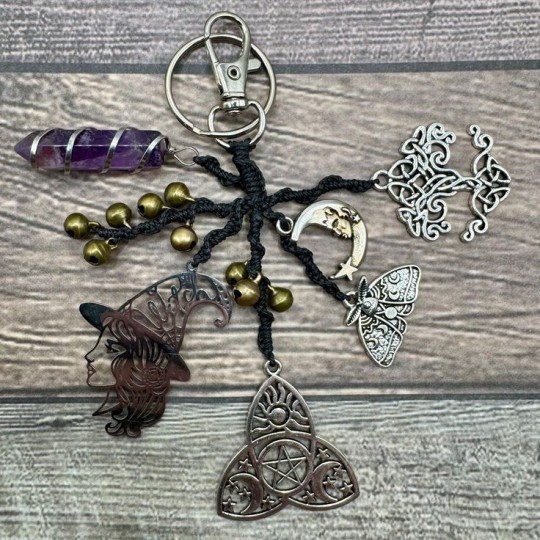
Power & Strength Symbols:
• Thor’s Hammer (Mjölnir) – A Norse symbol for protection and personal power.
• Dragon Symbol – Represents strength, wisdom, and magickal power.
• The Lion (Solar Power) – Represents courage, dominance, and royalty.
• Oak Leaf & Acorn – Strength, endurance, and longevity.
• Sowilo Rune (ᛋ) – Represents the sun’s power, success, and victory.
• Phoenix – A symbol of resilience, transformation, and rebirth.
Wisdom & Knowledge Symbols:
• Key – Unlocks new opportunities, wisdom, and secrets.
• Ouroboros (Serpent Eating Its Tail) – Represents infinite wisdom and cycles of renewal.
• The Owl – A symbol of wisdom, intuition, and the unknown.
• Merkaba (Star Tetrahedron) – Represents spiritual ascension and higher consciousness.
• Celtic Awen – Three rays representing divine inspiration, wisdom, and creativity.
• Feather – A symbol of knowledge, communication with spirits, and travel.
• Shell – Connection to water energy, emotions, intuition.
• The Labyrinth – A journey of self-discovery and enlightenment.
• Spider Web Charm – Symbolic of creativity, patience, weaving fate.
• The Book (Grimoire Symbol) – Represents arcane knowledge and magickal wisdom.
Healing & Health Symbols:
• Caduceus (Staff of Hermes) – Often confused with the Rod of Asclepius, it symbolizes healing and balance.
• Rod of Asclepius – A staff with a serpent, representing medicine and healing.
• Chalice/Grail – A symbol of spiritual nourishment and healing.
• Dove Symbol – Represents peace, purity, and emotional healing.
• Green Aventurine – A crystal associated with heart healing and vitality.
• Healing Hand (Reiki Symbol) – Used in energy healing practices.
Magick & Spiritual Symbols:
• Triple Moon (Waxing, Full, Waning) – Represents the triple goddess and the phases of magick.
• Yin-Yang – Balancing opposing energies, duality, and harmony.
• Infinity Symbol (∞) – Represents limitless potential and eternal cycles.
• Spiral (Sacred Geometry) – Represents cosmic forces, spiritual growth, and energy flow.
• Alchemical Symbols – Such as Sulfur (fire), Mercury (transformation), and Salt (earthly existence).
• The Sigil – A personal or created magical symbol for manifesting desires.
• The Triskelion (Triple Spiral) – A Celtic symbol of motion, progress, and spiritual evolution.
Death & Afterlife Symbols:
• The Scythe – Symbol of death, transformation, and the cycle of life.
• Anubis (Jackal-Headed Deity) – Egyptian guide of the dead and protector of souls.
• Raven & Crow – Messengers of the spirit world, associated with death and prophecy.
• The Skull – Represents mortality, spiritual protection, and wisdom.
• The Black Rose – A symbol of endings, transformation, and mourning.
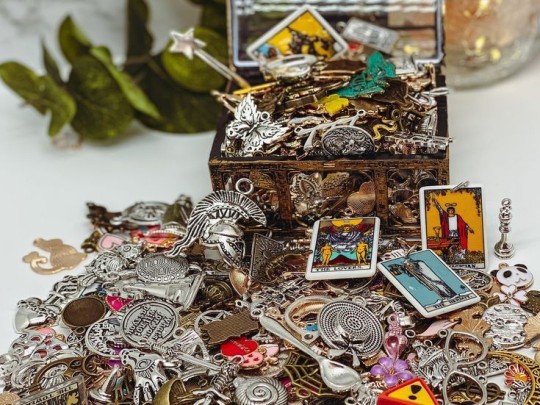
Storing & Carrying Magick Charms
Proper storage keeps charms energetically charged and ready for use. Here are some ideas for how to store your charms:
• Charm Bracelet – Wear daily for constant energy.
• Key Ring – Carry for protection, luck, or travel safety.
• Necklace or Amulet Pouch – Close to the heart for emotional or psychic work.
• Pocket Charm Bag – Small pouches with multiple charms inside.
• Altar Bowl or Plate – Keeps charms cleansed and charged.
• Wooden Box – A sacred space for unused or rotating charms.
• Glass Jars – Store charms by category (protection, love, luck).
• Hanging Charms – Over doorways, windows, or in cars for protection.
Activating & Charging Your Charms
Once stored, activate your charms to align them with your energy and purpose. Here are some methods for charging charms:
• Full Moon Light – Best for charms related to psychic abilities, intuition, and love.
• Sunlight – Increases vitality, confidence, and empowerment.
• Fire Energy – Hold over a candle flame to strengthen power (use fire-safe materials).
• Earth Energy – Bury in soil or place on a crystal for grounding.
• Anointing Oils – Rub with essential oils that match the intention (e.g., rose oil for love, peppermint for clarity).
• Breath & Spoken Word – Whisper affirmations or spells into the charm.
Example Activation Spell:
"By earth, air, fire, and sea,
A charm of power this shall be.
Blessed with magic, strong and bright,
Guided by love, luck, and light."
Using Magick Charms in Witchcraft
Protection Magick:
• Wear as Jewelry – Carry protective charms like pentacles, hamsas, or evil eye symbols as rings, necklaces, or bracelets.
• Hang Above Doorways – Place charms like iron horseshoes, pentagrams, witch bells, or bindrunes on doors to keep negative energy away.
• Pocket or Pouch Carrying – Keep a small charm (such as a rune, hexagram, or protective sigil) in your pocket or mojo bag.
• Car Charm for Safe Travel – Hang protective symbols like an Eye of Horus, hag stone, or hamsa in your car.
• Candle Spell with Protective Symbols – Carve protective sigils or runes onto candles and burn them for shielding energy.
Love & Attraction Magick:
• Charm Bags for Love – Create a sachet filled with rose petals, cinnamon, and love-drawing charms to carry with you.
• Embedding in Jewelry – Enchant a piece of jewelry with attraction energy and wear it to enhance romantic appeal.
• Love Candles – Use pink or red candles and tie love charms to them for love spells.
• Bath Ritual with Love Charms – Place rose quartz or heart charms in bathwater to charge yourself with loving energy.
• Knot Magick with Charms – Tie a ribbon around a love-attracting charm while focusing on your desire.
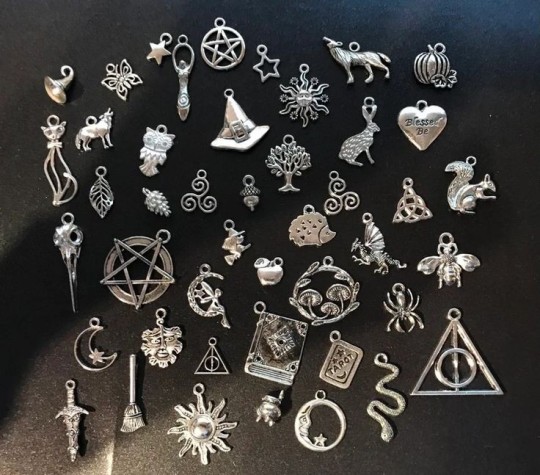
Prosperity & Success Magick:
• Prosperity Jar – Fill a jar with green aventurine, bay leaves, wealth charms and coins to attract wealth.
• Keep Money-Drawing Charms in Wallet – Carry a citrine crystal, Chinese coin, or prosperity sigil inside your wallet.
• Tie Wealth Symbols to Candles – Use green or gold candles and adorn them with symbols for financial success.
• Charm Your Work Desk – Place a charged prosperity charm on your workspace to attract career success.
• Bury a Charm for Long-Term Growth – Plant a coin or lucky charm in the soil with a new plant to manifest sustained wealth.
Healing & Well-being Magick:
• Crystal Healing Charms – Wear or carry stones like amethyst, jade, or lapis lazuli for mental and physical healing.
• Drink Infused Herbal Water – Charge a charm with healing energy and place it beside a cup of herbal tea.
• Create a Healing Amulet – Anoint a small token with essential oils like lavender or rosemary and carry it for health.
• Under-Pillow Charms for Rest – Place a dream charm or amethyst under your pillow to promote restful sleep.
Divination & Psychic Enhancement:
• Pendulum Work – Use a small charm as a pendulum for dowsing and spiritual guidance.
• Charms with Tarot Cards – Keep psychic-enhancing charms with your tarot deck for clearer readings.
• Crystal Ball or Scrying Mirror with Charms – Keep a pentagram, labradorite, or a third-eye charm near scrying tools.
• Create an Intuition Talisman – Carry a charm or rune (such as Algiz or Ansuz) to strengthen intuition.
• Anointing the Third Eye – Use a charm to draw anointing oil onto the third eye for spiritual awareness.
Spirit Communication & Ancestral Work:
• Ancestral Altar Offerings – Place a charm representing your ancestors on your altar to honor and connect with them.
• Use Spirit Keys – Enchant an old key as a tool to unlock communication with spirits.
• Bone or Shell Divination – Keep a charm or marked bones for spirit-based divination.
• Spirit Sigils - Use name sigils or symbols of spirits to connect with them.
• Carve Names on Candles – Inscribe an ancestor’s name on a candle along with a symbolic charm for guidance.
• Use a Spirit Bottle – Fill a small bottle with herbs, salt, and charms to aid in contacting spirits.
Shadow Work & Personal Growth:
• Shadow Work Charm Pouch – Keep black tourmaline or obsidian, a moon, a skull, etc. charm in it for deep introspection.
• Mirror Work – Put a shadow work charm on a mirror and use it for self-reflection rituals.
• Create a Personal Power Amulet – Enchant an item with affirmations for self-empowerment.
Warding & Banishing Negativity:
• Black Salt & Charm Mix – Combine black salt with a protective charm and sprinkle it around your home.
• Smoke Cleansing with Charms – Pass a protective charm through incense smoke to empower it.
• Candle Banishing Ritual – Carve a banishing sigil onto a black candle and burn it while focusing on removing negativity.
• Mirror Magick for Reflection & Deflection – Charge a small mirror charm to send negativity back to its source.
Elemental Magick Uses:
• Earth Charms – Bury a stone charm in soil to manifest long-term goals.
• Air Charms – Hang charms in trees or use feathers to enhance communication and wisdom.
• Fire Charms – Burn symbols in fire to release intentions or perform fire scrying.
• Water Charms – Place charms in a bowl of water under the moonlight for cleansing and intuition.
Dream Magick & Astral Travel:
• Dream Charm Under Pillow – Use an amethyst, moonstone, or dreamcatcher to encourage prophetic dreams.
• Charm on Bed Frame – Put a charm under your bed or mattress to enhance dream recall and astral travel.
• Silver Cord Charm – Carry or wear a silver cord for protection during astral projection.
• Anointing with Mugwort Oil – Use mugwort-infused oil on a charm to enhance dream visions.
Retiring or Disposing of Old Charms
If a charm loses its energy, becomes damaged, or is no longer needed:
• Bury It – Returns energy to the earth.
• Burn It – Safely burn wooden or biodegradable charms.
• Release It into Water – If eco-friendly (e.g., shells, stones).
• Gift It – Pass it to someone who may need its magic.

Magick charms are versatile, powerful tools that enhance spells, offer protection, and bring luck. Whether worn, carried, or placed in a sacred space, they infuse your life with magick while keeping your intentions aligned.
#charms#Charm#symbols#pendant#keycharm#keychain#witch#magick#witchblr#witch community#eclectic witch#eclectic#pagan#enchanted#enchantment#protection#wealth#Luck#spiritual#psychic#power#spirit#spirit work#spellwork#spellcasting#spell#talisman#amulet#symbology#witchcraft
258 notes
·
View notes
Text
That evil eye ring you bought from Amazon is useless.
Amulets and talismans need to be activated. Otherwise they're just pieces of junk from China.
For real occult protection, acquire:
1) An evil eye ring made of metal, not plastic. It must be white and dark blue, not turquoise or mint green. 2) A piece of handmade natural paper, that is, anything made from plant, such as papyrus and banana, and uncoated by chemicals like polymers. 3) A pen owned by your birth mother or father. Whether the owner is dead or alive, ask for permission.
On the first night of the next full moon…
1) Open the windows to gaze upon the moon while taking four deep breaths. 2) Stay by the window, and write on your paper with your marker: PORTO HAMASIAS F EMANUEL F DORENUS 3) Wrap the evil eye ring with the piece of paper. 4) Close the windows, but leave the wrapped ring by the window sill where the moonlight can reach it. By sunrise, you will have created an amulet that will protect you from curses — both intentional and not. 5) Wear the ring, and keep the paper in a safe place. Return the pen to its owner.
As long as the ring is on your finger or touching any part your skin, you are shielded from bewitchment.
Never let it get wet. Do not bathe or swim with it. Water drains its power.
For an amulet to keep working, it needs to be fed. Every full moon, wrap the ring in the same paper you used when you forged it. Leave it overnight by the window sill where the moon can shine on it, as you did when you created it.
Your ring can protect any soul to whom you willingly lend or give it. But if anyone uses it for protection without your permission, it will release onto them any curses it had previously absorbed and deactivated.
136 notes
·
View notes
Text
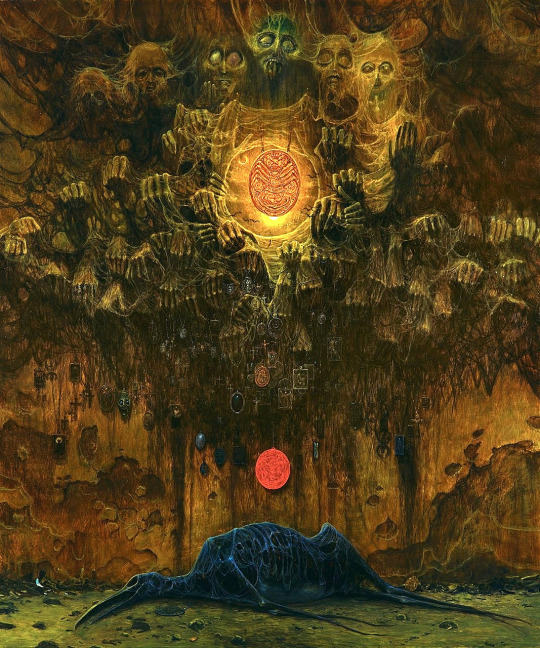
568 notes
·
View notes
Text

collection of ancient amulets and various wizard knick knacks
#abraxas#abraxas amulet#hekate#amulets#talismans#intaglio#ancient greek amulet#gnosticism#occultism#magic#witchy aesthetic
69 notes
·
View notes
Text

Viking Bear Claw Amulet, Jorvik, York
#vikings#viking#archaeology#ancient cultures#amulet#talisman#charm#ancient living#ancient beliefs#bear#viking life#york#jorvik#relic#claw
38 notes
·
View notes
Text
Ancient Amulets and Talismans: The Magical Legacy of Protective and Prosperous Symbols
Exploring the Historical Significance and Modern Interpretations of Greek, Greco-Roman, and Celtic Amulets and Talismans in People Magical Practices and Cultural Beliefs
In recent times, amulets have once again become consumer items. I say "once again" because the sale of amulets spans thousands of years. However, unlike in previous centuries, they have lost their sacred character. Since people sometimes ask me for a "prosperity amulet"—having seen them for sale elsewhere—I believe it's an excellent opportunity to discuss the topic.
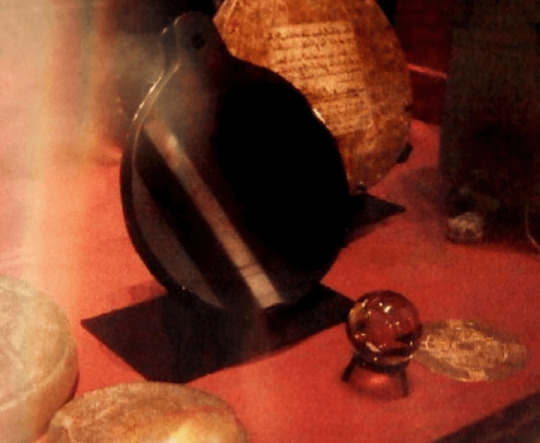
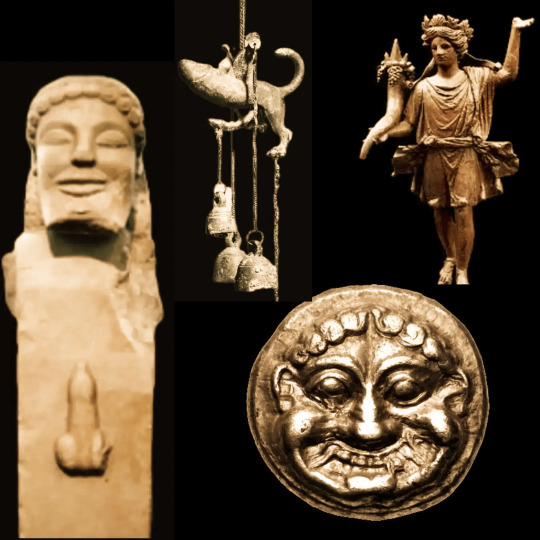
Left: Photo of Dr. John Dee's Black Obsidian Scrying Mirror on Display at the British Museum; Right: On the left, a marble herma with the head of Hermes and an erect phallus on the front of the pillar; above, a Roman tintinnabulum with a hybrid shape of an erect phallus and lion; below, a wappenmünzen with Medusa's effigy; to the right, a lar or Roman representation of the family spirit protector of the home holding a cornucopia.
Surprisingly, I agree with the definition of amulets, except for the "supernatural effects" attributed to them. We attribute certain powers or qualities to the natural world, and all objects from the natural world share the same symbolism, being associated with the culture we belong to and our personal and family beliefs.
In magical arts, there are two distinct types of these magical objects: amulets and talismans. To simplify, amulets are designed to ward off negativity, while talismans attract all kinds of fortunes. They are two sides of the same coin but are not the same. Ancient amulets require a broader explanation—I'll touch on that towards the end—but for practical purposes, the operative definition in the context of current magic is that amulets repel and talismans attract.
To acquire its power, this magical object requires four complementary actions:
Apotropaic: This is the most popular type and does not require formal magical knowledge. For example, a stone naturally holed by erosion. The powers considered are part of the culture, like believing in the protection of a St. Christopher medallion, which can have apotropaic qualities either inherently (animism) or by being "blessed" by a priest.
Liturgical: This involves sanctifying the object through religious rites, invoking the power of entities, gods, or spirits. An example is the aforementioned blessing of the St. Christopher medallion, where the priest acts as an intermediary and channel for the saint's power.
Energetic: Known as "charging" or "energizing," this action seeks to multiply the amulet's power. This does not necessarily involve a religious ritual. For example, leaving a stone exposed overnight to moonlight to "charge" it.
Sympathetic: This transfers the symbolic to reality through signs, words, the addition of objects, or spells. For example, engraving a talisman with the image of a desired book to attract that book, representing the desired object and making it appear in the material world.
Some details: If you buy an amulet because someone told you it's protective, you're trusting the seller's word, not the amulet's properties. If you value the seller's word—as some do with a priest—then you indeed have a powerful object. You can also buy a personalized amulet and "charge" it yourself, but you'd be purchasing the container of power, not the amulet itself. If you learned as a child that a horseshoe above the door brings good luck, then go ahead, because your subconscious likely considers that horseshoe very protective.
For millennia, writing was considered a magical art. The privileged classes guarded it zealously, believing that certain symbols possessed inherent magical powers. This tradition persists even in modern movies, where we see Count Dracula writhing in pain at the sight of a cross. This is the animistic theory of talismans’ operation, prevalent in popular and pagan witchcraft, both ancient and modern.
Today, many magicians reject this theory in favor of the energetic theory of talismans’ operation. They consider the most important thing is to charge the talisman or amulet, that is, to introduce magical energy into the chosen object to make it powerful. The time spent carefully drawing specific symbols on the object is an effective way to create and transmit energy. Adding this energy to the one generated and directed by the magician during the charging ritual explains why this magical technique is so powerful. However, no method—be it Witchcraft or Ritual Magick—is superior to another.
Stones for Making Amulets and Talismans
In historical families of the Celtic areas of the British Isles, the tradition of attributing powers to certain stones has a long history. The most famous of this legacy is the Lee Penny, belonging to the ancient Scottish family of Lockhart. This red stone, set in a silver coin, was believed to have powers to heal cattle: the magical technique involved immersing the stone in water and giving this water to the sick cattle. Sometimes, the distinguished family lent or rented the stone to others with cattle, representing a shared belief and magical practice by a community.
Astrological guardianship is crucial to determining the virtues of stones. Most modern lists of zodiac stones or "sign stones" are purely marketing; though beautiful, wearing the wrong stone has no significant magical effect unless you believe in it wholeheartedly (not the seller). However, some lists of stones and their astrological correspondences have ancient consolidation, like the one mentioned in the Bible about the High Priest of Israel's breastplate (Exodus 28:15-21). Historian Flavius Josephus says the stones on the breastplate symbolize the twelve months and the twelve zodiac signs, with the two large stones representing the Moon and the Sun. The current custom of wearing sign stones originated in the 16th century in Poland, among the Jewish jeweler guild interested in the breastplate's mysticism. Nonetheless, the astrological and planetary correspondences do not match the instructions for the stones we can buy today in the Jewish Quarter or any fair ( here you can read the History, magical uses, and spiritual meanings of precious and semi-precious stones).
Due to its color, one of the most magically charged stones is obsidian—less so, onyx—as it is believed to have trapped the very night. The magical mirror of Elizabethan astrologer Dr. John Dee, to whom we owe powerful Enochian magic, was made of polished obsidian.
If you're looking for a universal talisman or amulet but have a limited budget and do not trust the seller's knowledge, the mineral with which we can all symbolically associate attraction and repulsion is the old and beloved magnet. Magically, it is associated with attraction, but it can be used both to attract and repel, especially if combined with the symbolism of the metal it attracts, iron, representing Mars and Aries.
With the right moon, the right day, a spell written by you, and a good magnet, you will have a much more effective talisman than any piece bought in Villa Biarritz market.
Greek and Greco-Roman Amulets and Talismans
In ancient Greece, the most commonly used apotropaic symbols were the eye, the gorgoneion, and the genitals. These symbols were used in various ways. For example, some Greek kylikes were decorated with two large eyes so that when brought to the lips to drink, the face was completely covered by the cup: the person facing the drinker only saw, as if it were a mask, two intimidating fixed eyes. The eyes served as protection against critics and the evil eye, and also allowed the drinker to cast a glance at the guests, giving them the unsettling sensation of being constantly watched. The function of decorated kylikes was to give the illusion of control over one’s destiny and the destiny of others. To protect against enemy attacks and deceive death, the eye was also present in contexts like the Pyrrhic dance and in war weapons, generally represented on shields.
Apart from the eyes, the gorgoneion (or gorgonian) was also depicted on the shields of Athenian soldiers, as Perseus was a favorite of the goddess Athena. The gorgoneion is nothing more than the head of Medusa, the gorgon well-known for her ability to petrify anyone who dared to look into her eyes. Other attributes include the snakes for hair and the boar's tusks for teeth. A more recent interpretation of the myth shows empathy for Medusa because her head was severed by Perseus. However, unlike, for example, Ariadne, Medusa is not a mythical woman but a terrible monster, the embodiment of Death before whom we are all defenseless. (If you want to know my stance on the reinterpretation of myths, you can read the entry about Lilith)
Finally, the erect phallus was present in many iconographic contexts. Depending on the scenes, phallic representations could be simple erotic decorations, symbols of apotropaic objects, or serve to attract fertility and fecundity, similar to the cornucopia or horn of plenty. For instance, some scenes with an erect phallus were placed at crossroads and property boundaries; along with the phallus, a rudimentary bust was generally sculpted in stone. This stone was called herma, originally representing the god Hermes, protector of travelers and merchants, psychopomp and lord of the roads. Sometimes, this hermetic pillar was depicted in skyphos along with the caduceus, also an attribute of Hermes. Other examples include kantharoi with representations of satyrs with an erect phallus, illuminating maenads who carry the thyrsus in the retinue of Dionysus.
In Roman times, the preferred object to ward off evil influences was a kind of rattle usually placed on the doors and thresholds of houses. One of the most beautiful examples was found in Pompeii and features five phalli arranged like horns. Astragali and protective hand figures were also popular, as were the gorgoneion and cornucopias—whose origin lies in the goat Amalthea who nursed Zeus—as an attribute of the goddess Fortuna. Mercury's tintinnabula, which had the apotropaic function granted by the phallic rays emanating from the god's head, were also fashionable. This type of tintinnabulum is fascinating because it simultaneously served to protect and attract luck and fortune with the bag of coins Mercury held in his hand.
Tarot by Kema
Montevideo
#uruguay#montevideo#witchcraft#pagan#witches of tumblr#magick#wicca#hellenic polytheism#hellenic pagan#hellenic deities#amulets#talismans#kabbalah#astrology#witchblr#tarot por kema#paganismo#witchy aesthetic
39 notes
·
View notes
Text
Do you need a talisman or an amulet for your Saturn return?
According to the Merriam-Webster dictionary, a talisman is "an object held to act as a charm to avert evil and bring good fortune."
Instead, an amulet is defined as "a charm (such as an ornament) often inscribed with a magic incantation or symbol to aid the wearer or protect against evil (such as disease or witchcraft)."
There's some overlap between the definitions because both a talisman and an amulet can protect the wearer against evil.
But talismans seem to have nicer connotations because they can bring good fortune.
A talisman protects you AND brings good fortune. An amulet just protects you.
Which one would you choose to wear during your first Saturn return?
#talisman#amulet#astrology#astro observations#astro community#astro notes#astrology community#astro tumblr#saturn#saturn return#saturnreturn#late twenties#astrologer#astro placements#astro posts
22 notes
·
View notes
Photo
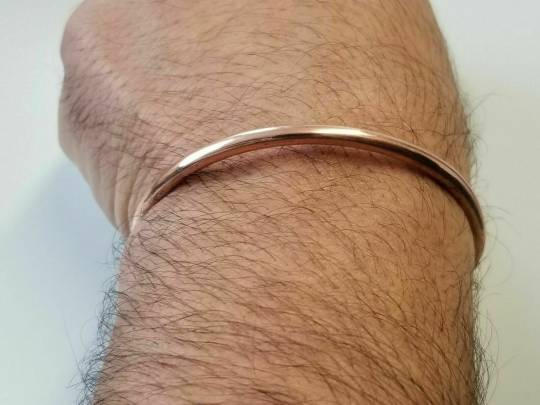
Sadhguru copper punjabi hindu sikh singh adjustable snake healing kara bangle G
Sadhguru Pure Copper Punjabi Hindu Adjustable Size Snake Head, Round and Smooth Healing KaraFeatures:
- 100% Pure copper Bracelet
- Smooth Finish
- Good Luck Bracelet
- Medicinal/Health Benefits to the wearer
- Healing kara
- Evil eye Protection Talisman Amulet
- Positive Energy
- also used for Astrology Benefits
- Used to cure Astrological defects of Horoscope
- helpful for Yogic Mantras/Yantras
- Spiritual benefits
- Religious Values
Please note multiple photos are there to show different angles of the same item.
Only one kara will be included per sale but you can choose quantity from variation list if you need more than one Kara.
Width of Kara is 4 mm. Weight is approx. 20g to 28g variable due to size.
These Kara are adjustable but still available in four sizes Small (Kids size), Medium Size, Large and Extra Large Sizes.This KARA is Plain and SMOOTH - as shown in photos - Popular design in market right now - very famous in youngsters and we are the only seller who has this exclusive design for sale in UK.
#adjustable bangle#amulet talisman#bangle bracelet#copper kara#evil eye protection#hinduism sikhism#kada bangle#mantra yantra shield#meditation health#muslim healing#shani shukar tantar#sikh hindu islam#snake head karra
0 notes
Text


Harvest Moon Green Tassel Gold Celestial Talisman Earrings ✨️
Featuring large brass moon face stars that dangle green suede tassels from u-shaped connectors. Frosted glass crescent moons are suspended in the center of each earring. The hooks are gold plated
They hang 3.5 inches
Made with nickel free materials
Buy them here
#rabbitpaws#celestial jewelry#celestial#moon earrings#autumn witch#cottagecore#moon and stars#crescent moon#moon witch#harvest moon#autumn jewelry#light academia#smoky quartz#witchy#artists on tumblr#faery#whimsigoth#witchcore#elven#medieval#art nouveau#amulet#talisman#star earrings#woodland#victorian#edwardian#academia aesthetic#hellenic pagan#moon goddess
38 notes
·
View notes
Text

Vintage Jewish Amulet w/ fitted case. Circa: 20th century.
Amulet size: approx. 9.8cm x 6.5cm
49 notes
·
View notes
Text
3-Year-Old Girl Finds 'Beautiful' 3,800-Year-Old Egyptian Scarab Amulet During Family Trip - @people Israel Archaeology Anthropology 🇪🇬 🇮🇱 Some positive News for a minute 😉🧿
#israel#Egypt#ancient egypt#child#Amulet#Cool News#positive news#arabic#jewish#Archeology#anthropology#people magazine#Talisman
9 notes
·
View notes
Text
Magickal tools
Charms, amulets, and talismans are objects that are believed to possess magical or mystical properties and are often used for protection or to bring good luck.
While the terms are sometimes used interchangeably, they have slightly different meanings:
Charms: A charm is an object that is believed to have magical power to protect the wearer from harm or to bring good luck. Charms are often worn as jewelry, such as a necklace or bracelet, and may be made from a variety of materials, including metal, stone, or wood. Examples of charms include a four-leaf clover, a horseshoe, or a rabbit's foot.
Amulets: An amulet is also an object that is believed to have magical power, but it is typically worn or carried for the purpose of protecting the wearer from evil or harm. Amulets are often made from materials that are believed to have protective properties, such as certain stones, metals, or herbs. Examples of amulets include a crystal pendant, a piece of amber, or a protective talisman.
Talismans: A talisman is an object that is believed to have magical power to bring good fortune or to achieve a specific goal. Talismans are often created for a specific purpose, such as attracting love, wealth, or success. They may be made from a variety of materials, such as precious stones, herbs, or metals, and may be worn or carried as a reminder of the desired outcome. Examples of talismans include a lucky coin, a mojo bag, or a sigil.
In summary, while charms, amulets, and talismans are all believed to have mystical properties, they have different purposes and uses. Charms are worn for good luck, amulets for protection, and talismans for achieving specific goals or desires.
#charms#talismans#amulets#magic tools#magikal tools#witchblr#witchcore#witchcraft#witchlife#white witch#beginner witch#witch tips#grimoire#spirituality#book of shadows
177 notes
·
View notes
Text
I like big books and I cannot lie 🎶




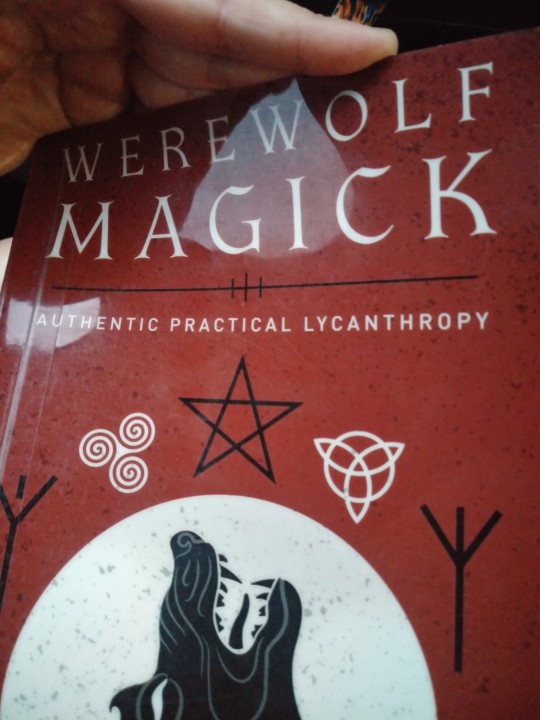
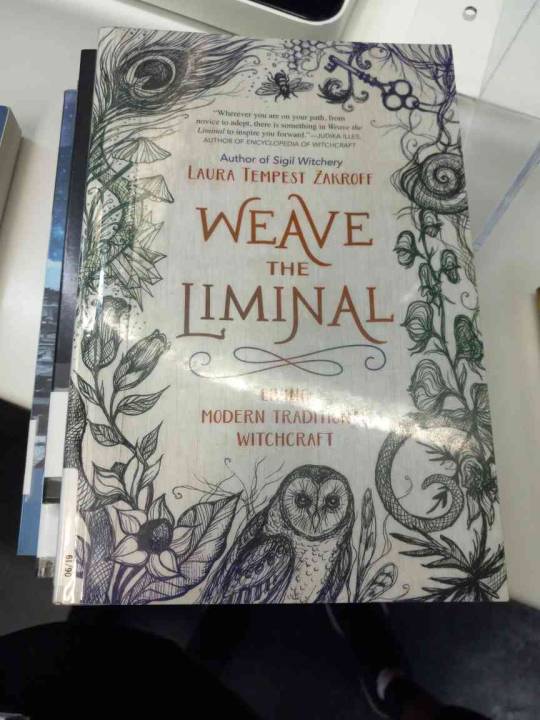

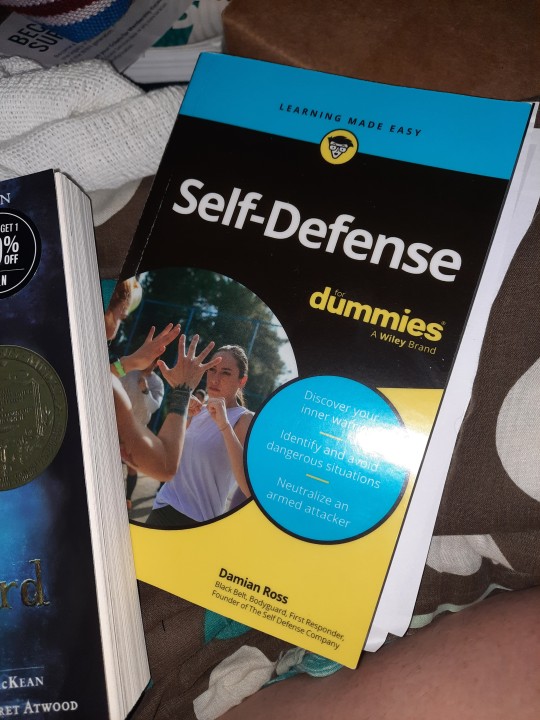
some books I gave recently grabbed from the library.
I liked and wanna buy Do I Have To Wear Black? Lots of good info in there on funerary customs. I wasn't sure I was gonna like it because of the Wicca mentions at first but I was actually pleasantly surprised as I got into it. I sort of blew through it tbh because I'm not super interested in like the Kemetic or Wiccan customs, just the Norse/ heathen and Hellenic, but the very general parts at the beginning were really informative. Mortellus is a mortician and 100% definitely knows what in the heck they're talking about.
I skimmed through the Thrifty Witch book and Tarot Interactions before bringing them back because those I just need to have/ buy. I need to buy those. Thrifty Witch would definitely be more useful to me as a resource than something to read if that makes sense.
and similarly with Tarot Interactions, that is an absolutely fantastic excellent book from what I read of it, and I definitely absolutely need to have that as a resource. I also feel like that's something I wanna take my time with, not rush.
Werewolf Magick was meh. I soared through it. I was rolling my eyes at far too much of it to take any of it seriously, and by the time I got to what I was interested in/ what might have helped, couldn't understand it because of all the weird lingo/ jargon that he'd set up at the beginning. Admittedly that's my own fault obviously for trying to skip to the end, but the first part just made me cringe too much. There's too much mixing of different practices in a way that imo honors none of them, and then mixing it with crap like Wicca to boot. I just... no, I'm good, no thank you. I had gotten it out of curiosity, expecting it to not be much and... yeah, it was what I expected.
Witch Queens, Voodoo Spirits, & Hoodoo has been fantastic so far and I have got to finish it. I started it and got distracted and it went back on the shelf and I've gotta get back into it. It starts with Annie Christmas who is none of the things mentioned on the cover, lol, but I love the way it talks about our local myths and legends. Absolutely A+ 100% yes.
Weave the Liminal is... surprisingly better than I expected so far? I'm not quite sure what to make of it. We'll see as we go.
I've had the ones in that first three pictures checked out for a while and I really need to get to them. I was hoping the Shamanism Bible would give me some words to look up, a good place to start research into that but it feels like too much of a chore. The charm bag and ancestor books I just keep forgetting I have, and I expected the New Orleans one to be a quick read but again keep forgetting it's there.
Did I grab too many books? Yes, every damn time. I have maxed out how many I can borrow from the library. Oooops. xD
I absolutely had to grab The Holy Wild Grimoire though when I saw it on the shelf because that has been on my wishlist for a while and I love checking out books before buying them. I feel much better about purchasing when I already know I like them.
#books & libraries#library#books and reading#pagan witch#witchcraft#witchblr#adhd witch#divination witch#eclectic witch#goddess of witchcraft#neurodivergent witch#oracle witch#hekate#morrigan#voodoo#voodou#new orleans#hoodoo#shamanism#shamanistic#books are magic ✨#amulets & talismans#charm bags#ancestors#ancestor magic#history#research#funerary rights & practices#death dying funerals#paganism
30 notes
·
View notes
